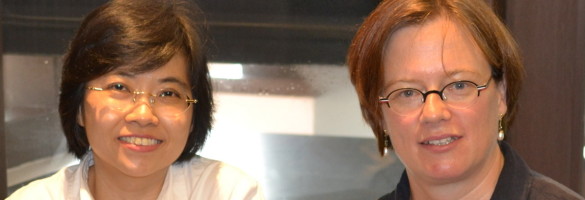This article was originally published in the October 2013 issue of the Singapore Law Gazette, the official publication of the Law Society of Singapore.
27 October 2013, Singapore. Dr Julia Hörnle, a Professor in Internet Law at the Centre for Commercial Law Studies of Queen Mary University of London (“QMUL”), School of Law, is a visiting professor at the National University of Singapore, School of Law this summer. In 2013, she was advising the Commission of the European Union on the Directive on Alternative Dispute Resolution (“ADR”) for Consumers and the Regulation on Consumer Online Dispute Resolution (“ODR”). She previously practised as a solicitor at the international law firm Eversheds, at their London and Brussels offices. While meeting Dr Hörnle over tea, Constance Leong, QMUL alumna and intellectual property lawyer, had the privilege of tapping into her expertise.
Constance: The ease of “clicking” to contract with individuals and businesses from different jurisdictions without having met face to face is becoming the norm today. At such times, cross-border internet disputes resolutions become critical. Without an effective redress for complaints resulting from cross-border online transactions, the development of e-commerce would be stifled. Consumers would lose out by not being able to shop online across borders. They would then miss the opportunity of comparing the costs of products and services in a wider market and of buying them where they are less expensive. Both the European Union (“EU”) [1] and the United Nations Commission on International Trade Law (“UNCITRAL”)[2] have recently issued proposals on creating online dispute resolution (“ODR”) systems for solving e-commerce disputes. Your book Cross-Border Internet Dispute Resolution(Cambridge University Press, 2009) mentioned ODR as being a progeny of alternative dispute resolution (“ADR”). Could you tell us more about online dispute resolution, particularly how it incorporates the due processes of mediation and arbitration?
Dr Julia Hörnle: Online dispute resolution (“ODR”) is a collection of alternative dispute resolution mechanisms (“ADR”) adapted for use on the Internet. The important point is that ADR is outside the Courts and without the complexities of international cross-border jurisdiction. In traditional litigation, it is often necessary to hold preliminary hearings about which Court is competent. This cost is avoided by using ODR. ODR can consist of online mediation, online arbitration, using online technologies, such as a chat rooms, instant messaging or online arbitration using a web filing platform, such as NetCase (used by the International Chamber of Commerce (“ICC”), International Court of Arbitration[3] and AAAWebFile® (used by the American Arbitration Association). In fact, ODR has developed innovative online processes, such as mock trials[5] (where a “jury” of online volunteers deliver a verdict based on a set of facts as a form of crowd sourcing) or automated blind-bidding negotiation techniques (where each party makes successive monetary settlement offers, which are not disclosed to the other party and lead to a settlement if and when the bids come within close reach of each other). There is a whole range of facilitative technologies out there to be explored.
Constance: Do you see certain kinds of contracts, for example those involving IP, franchising, R&D, webpage design, technology-sensitive employment contracts, publishing or music and film contracts as better suited to online dispute resolution than others?
Dr Julia Hörnle: Online dispute resolution is best suited to conflicts where most of the evidence is online. It is also best suited to disputes where the value in dispute is relatively small. Going by the standards set by the Small Claims Tribunal at the Singapore Subordinate Courts, a claim less than S$20,000 [6] would be considered small.
Constance: The Uniform Domain Name Dispute Resolution Policy [7] (“UDRP”) is a good example of online dispute resolution. Established dispute resolution providers, like the WIPO ADR Arbitration and Mediation Center, use the UDRP. Are there any areas the UDRP can be improved?
Dr Julia Hörnle: The UDRP has been an enormous success in terms of the number of cross-border disputes solved, quickly and informally, often involving parties from different jurisdictions. It is also very transparent, as all decisions are published on the dispute resolution providers’ website. However, I am of the view that it can be improved in particular in terms of fairness, to create a level playing field between domain name registrants and trademark holders. Currently, the Administrative Procedure [8] is in favour of an English-speaking party, who is more often than not, the Western trademark holders. Also, the UDRP procedure, with its 60-day timeline, may be too short a time for a small business owner to react, for example if that person is away on holiday.
Constance: Since 1 June 2013, the Singapore Media Development Authority (“MDA”) has required online news sites to be individually licensed if they fall within certain criteria.[9] Previously, these sites were automatically class-licensed under the Broadcasting Act. Under the new licensing framework, online news sites are expected to comply within 24 hours to MDA’s directions to remove content that is found to be in breach of content standards, and are required to put up a S$50,000 performance bond. I believe countries like UK/EU are already familiar with such complex issues. How do UK/EU regulators deal with such issues relating to online news sites?
Dr Julia Hörnle: This is an interesting point as convergence between broadcasting and the Internet media is definitively on its way. Newspapers in the UK are not licensed to enable freedom of the press, plurality of views and criticism of government, which under the UK system have been encouraged as vital to public debate and deliberation. But there have also been abuses by the press, for example, in relation to individuals’ privacy. For this reason there is a self-regulatory system, which is currently being reformed (see the Leveson inquiry).[10] This reform has proved to be very controversial.
Constance : I understand that you are also the programme director of QMUL LLM (computer and communications law).[11] What would you say is the most attractive feature of your LL.M. programme?
Dr Julia Hörnle: We have two LLM programmes; one is taught physically in London, the other is a distance-learning programme. Students can come to London or stay at home and pursue a LLM programme online. The special feature of our LLM programme is that it offers a large number of highly specialised modules in areas such as IP law, computer and communications law, shipping law, insurance law, arbitration and dispute resolution, energy law, banking and finance, etc. There are over 100 options. Students are taught by law professors and experienced senior practitioners. The LLM is very international and students come from every corner of the world, which offers great networking opportunities. The distance-learning programme is very interactive. The students discuss cases in chatrooms and on blogs. It is taught entirely in a virtual learning environment. So students do not have to attend class. Most students study part-time on our distance-learning programme while working; it is flexible enough to accommodate that.
Constance: What do you think are the main similarities and differences between internet law in Europe and Asia (in particular, Singapore)? What may be some of the underlying reasons for these differences?
Dr Julia Hörnle: Most states have to deal with similar issues arising from advances in technology and all states wish to encourage new technologies. As a consequence, laws in many areas are quite similar. States vary in their assessment of how much internet content should be or should not be regulated, so it is the balance between freedom of speech and other important values, such as privacy or child protection.
► Constance Leong [12]
Goh Phai Cheng LLC
E-mail: constanceleong@gohpc.com
Disclaimer: The opinions expressed in this article are the sole responsibility of the author and do not necessarily reflect any position or policy of Goh Phai Cheng LLC (‘the firm’). While every effort has been made to ensure that the information contained in this article is correct, neither the author nor the firm can accept any responsibility for any errors or omissions or for any consequences resulting therefrom. Nothing in this article is intended to amount to legal advice and professional opinion should be sought on a case by case basis.
All references with hyperlinks were last accessed on 22 August 2013.
Notes
1 Regulation (EU) No 524/2013 of the European Parliament and of the Council of 21 May 2013 on online dispute resolution for consumer disputes and amending Regulation (EC) 2006/2004 and Directive 2009/22/EC (Regulation on consumer ODR) OJ 2013 L165/1.
2 UNCITRAL Working Group III (Online dispute resolution), Online dispute resolution for cross-border electronic commerce transactions: draft procedural rules, Note by the Secretariat, Twenty-seventh session, New York, 20-24 May 2013.
3 https://www.iccnetcase.org/Netcase/pdf/Pamphlet_En.pdf .
4 http://www.adr.org/aaa/faces/services/disputeresolutionservices/onlineservices?_afrLoop=1239993138473246&_afrWindowMode=0&_afrWindowId=avsugsxf_114#%40%3F_afrWindowId%3Davsugsxf_114%26_afrLoop%3D1239993138473246%26_afrWindowMode%3D0%26_adf.ctrl-state%3Davsugsxf_134
5 http://www.ejury.com and http://www.virtualjury.com
6 Section 5 of the Small Claims Tribunals Act (Cap 308).
7 http://www.icann.org/en/help/dndr/udrp/rules
8 http://www.wipo.int/amc/en/domains/guide/#b2
9 The criteria are: (i) report an average of at least one article per week on Singapore’s news and current affairs over a period of two months, and (ii) visited by at least 50,000 unique IP addresses from Singapore each month over a period of two months.
10 Chaired by Lord Justice Leveson. See http://www.levesoninquiry.org.uk
11 http://www.law.qmul.ac.uk/postgraduate/distancelearning/computer_communication/
12 LLM (London), Advocate & Solicitor (Singapore), Barrister-at- law (Middle Temple), Solicitor (England & Wales).
Updated: 15 September 2016.

